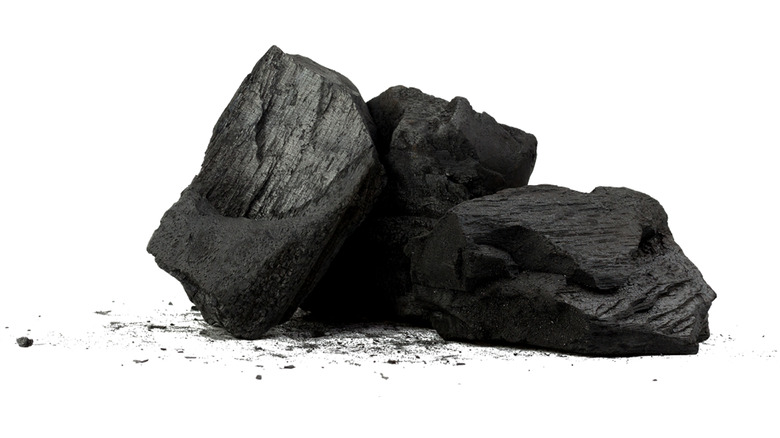Why You Should Start Keeping A Few Pieces Of Charcoal In Your Fridge
It's hard to underestimate the usefulness of baking soda — from creating light, fluffy cookies, to fun science experiments, to cleaning the oven, this simple white powder is a must-have household staple. But what if there was something that could do one of its most recognizable jobs better? Everyone knows that a box of baking soda can keep your fridge smelling fresh, but you might not know that the same can be said of charcoal.
According to Cuisine at Home, you can easily borrow some spare, additive-free briquettes from your grilling supplies and pop them in the refrigerator, as an inexpensive way to get rid of excessive odors. In fact, America's Test Kitchen determined that over the course of a month, a fridge containing a cup of charcoal was consistently rated as less smelly than one containing a cup of baking soda when the fridges were filled with the same group of pungent ingredients — including tuna, parmesan cheese, and onions.
Charcoal is super absorbent
So why is charcoal so good at de-stinking your fridge? According to America's Test Kitchen the answer is two-fold. First, charcoal briquettes or pellets — which can be found in most pet stores — are naturally porous so air flows through them readily. Secondly, they are made almost entirely of carbon, which as a substance is ideal for absorbing unpleasant smells and toxins, which is why it is also used in water filters.
America's Test Kitchen recommends using about two cups of charcoal in a small bowl or perforated plastic bag in the back of your fridge to keep it smelling fresh, and simply replacing the charcoal when smells start to become noticeable again. Interestingly though, when you switch out your briquettes that does not have to be the end of their usefulness.
While they may not be fresh enough to do the trick in your fridge anymore, This Old House notes that they can still help minimize the smells in your compost pile or be used around the yard as fertilizer. Like odors, charcoal is also good for absorbing moisture, so it can be used to keep your tools from rusting or in your bucket of ice melt in the winter to keep the salts from clumping.

